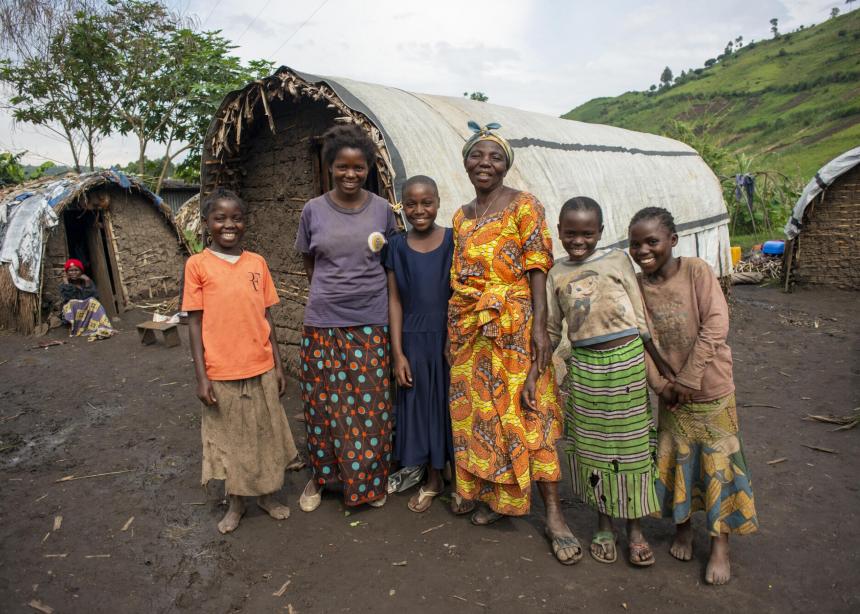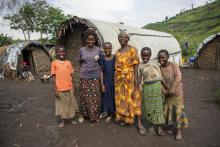Things like frequent handwashing and social distancing have become the new normal. This is life during the COVID-19 pandemic. These measures help reduce the spread and keep everyone safe. We’re all in this together.
But the hardships we bear are not the same. Some of our neighbours will be faced with impossible choices like staying home safely or earning enough to pay rent. Others have no one to call when they need help buying groceries. This virus is not an equalizer. It’s especially true for the tens of millions around the world who were already vulnerable before this crisis began. They face even greater risks during this pandemic.
Mennonite Central Committee (MCC) knows this well. For more than a century, MCC has cared for people who are vulnerable around the world. We know there’s not just one answer to a crisis. However, there are areas of MCC’s work that are vital to supporting people who are particularly vulnerable in situations like this.
Healthcare
Temporary shelters, close quarters and a lack of hygiene supplies—this is where disease and infection spread. It’s also the reality in the Mubimbi and Poste displaced persons camps in the Democratic Republic of the Congo (DR Congo.) MCC is partnering with the ECC-MERU (Church of Christ in Congo) to provide healthcare to displaced people there. A clinic provides treatment for the hundreds of people living in each camp.
Water and hygiene
Now that you’re washing your hands what seems like a dozen times a day, it’s easy to see the importance of clean, safe water. Many people around the world don’t have access to it. MCC supports water, sanitation and hygiene (WASH) programs that drastically reduce the spread of diseases. Clean water, effective hygiene practices and proper waste management keep people healthy.
Two remote Haitian communities, Wopisa-Gabriyèl and Kabay, saw 291 deaths from cholera in 2016. In 2017, MCC began public hygiene training, providing water purification equipment and building latrines. The result? Cholera was eliminated from the two communities.
In southern Chad, tens of thousands of refugees who’ve fled Central African Republic have virtually no access to resources. Living in camps and nearby villages, they often rely on unsafe open-pit wells for water. MCC partner SECADEV (Catholic Relief and Development) is working to install new sealed water pumps, build latrines and provide education on proper hygiene practices. This ensures waste doesn’t contaminate the local water supply.
Food assistance
It’s not unusual to hear reports of stores with empty shelves and restaurants closing in recent days. Feeling unsure of secure food is a new feeling for many of us. But millions around the world can’t walk to a nearby supermarket or order takeout when they are hungry. MCC provides emergency food and helps farmers grow food to feed their families.
After Cyclone Idai hit southeastern Africa in 2019, many families had no access to food. MCC and local Brethren in Christ churches worked to provide emergency food to thousands. This urgent work continues across the globe including places like Syria, DR Congo and Colombia.
In rural Cambodia, it’s common for families to run small-scale rice farms and vegetable gardens. But many don’t produce enough to sustain their homes. MCC partner Organization to Develop our Villages invests in farmer-led co-operatives, which bolster families’ ability to feed themselves and sell their surplus to pay for things like medical care.
Peacebuilding
The constant stream of news updates about the spread of COVID-19 has caused fear and anxiety for many. MCC’s peacebuilding tackles the difficult work of creating peaceful dialogue in areas of tension and conflict while also educating people about how to prevent the spread of the virus.
In 2006, Issa Ebombolo started Peace Clubs in three schools in Zambia to help students build peace and speak up for their rights and safety. Now, more than 650 peace clubs exist in 14 African countries, not just in schools. Communities, churches and refugee camps have also adopted this nonviolent method of building peace.
MCC is well positioned to respond to the impacts of the COVID-19 crisis in the places we work. Together, we can care for our neighbours, whether across the street or around the globe. Thank you for your support.
Related stories:
Water from stone
Compelled by Christ to serve
Sharing stories that spell MCC
Great Winter Warm-up produces 9,400 comforters
Watch: MCC is 100




Add new comment
Canadian Mennonite invites comments and encourages constructive discussion about our content. Actual full names (first and last) are required. Comments are moderated and may be edited. They will not appear online until approved and will be posted during business hours. Some comments may be reproduced in print.